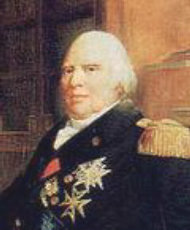Louis XVIII of France
|
|
Louis XVIII (November 17, 1755 - September 16, 1824) was King of France and Navarre from 1814 (although he declared that he considered his reign to have begun in 1795) until his death in 1824, with a brief break in 1815 due to Napoleon's return in the Hundred Days.
Early Life
Louis-Stanislas-Xavier was born on November 17, 1755 in the Palace of Versailles, Versailles, France, the fourth son of Louis, dauphin de France, and grandson of King Louis XV and Marie Leszczynska. At birth, he received the title of Comte de Provence but after his brother's accession to the throne he was generally known as "Monsieur," the standard title of the eldest brother of the King. After the death of his two elder brothers and the accession of his remaining elder brother as Louis XVI of France in 1774, he became heir presumptive.
The birth of two sons to King Louis XVI, left him third in line to the throne of France. During the events leading up to the French Revolution, Provence initially took a moderately liberal line opposing his brother, but the increasing radicalism of the Revolution very soon alienated him. He fled the country in 1791 at the same time as his brother's unsuccessful Flight to Varennes. The Comte de Provence was living in exile in Westphalia when the King was guillotined in 1793. On the king's death, Provence declared himself Regent for his nephew, the new King Louis XVII, although the boy never actually reigned. On the 10-year-old king's death in prison on June 8, 1795, Provence proclaimed himself as King Louis XVIII, although he was often referred to by the title of pretense of Comte de Lille. In the Verona Declaration, the pretender announced his rejection of all the changes that had been made in France since 1789, which effectively destroyed the position of moderate constitutional monarchists in France, who hoped to restore the monarchy under a limited constitution which would codify most of the changes since the Revolution began. This prompted the famous remark that the exiled Bourbons had learned nothing and forgotten nothing.
In the years that followed, Louis XVIII moved all over Europe, living for a time in Russia, before he settled himself in England. By this time, the conquests and success of Napoleon, who had established himself as Emperor of the French, made any Bourbon restoration seem unlikely.
Reign
However, in 1814, following the defeat of Napoleon, Louis XVIII was finally able to secure the French throne thanks to the support of the Allied Powers and, within France, Napoleon's old foreign minister Charles Maurice de Talleyrand. Although Louis was forced by Talleyrand and the Napoleonic elites to grant a written constitution which would guarantee a bicameral legislature, the Charter of 1814. The Charter created a hereditary/appointive Chamber of Peers and an elected Chamber of Deputies, although the franchise was extremely limited. Louis's regime also allowed much greater freedom of expression than the Napoleonic regime which had preceded it.
Louis's (largely symbolic) efforts to reverse the results of the French Revolution quickly made him unpopular. Within a year, he fled Paris to Ghent on the news of the return of Napoleon from Elba, but returned after the Battle of Waterloo had ended Napoleon's rule of the Hundred Days. This Second Restoration saw the atrocities of the White Terror, largely in the south, when supporters of the monarchy murdered many who had supported Napoleon's return. Although the King and his ministers opposed the violence, they were ineffectual in taking active steps to stop it.
King Louis' chief ministers were at first moderate, including Talleyrand, the Duc de Richelieu, and Élie Decazes, and Louis himself followed a cautious, moderate policy, hoping that moderation would insure the continuation of the dynasty. The parliament elected in 1815, dominated by ultraroyalists, or Ultras, was dissolved by Richelieu as being impossible to work with, and electoral gerrymandering resulted in a more liberal chamber in 1816. However, the liberals ultimately proved just as unmanageable, , and by 1820 Decazes and the King were looking to revise the electoral laws again to insure a more conservative majority. However, the assassination of the Duc de Berry, the ultrareactionary son of Louis's ultrareactionary brother (and heir-presumptive) the Comte d'Artois, in February 1820, caused Decazes's fall from power and the Triumph of the Ultras. After an interval in which Richelieu returned to power from 1820 to 1821, a new Ultra ministry was formed, headed by the Comte de Villèle, a leading Ultra. Soon, however, Villèle proved himself to be nearly as cautious as his master, and, so long as Louis lived, overtly reactionary policies were kept to a minimum.
Louis XVIII died on September 16, 1824, and was interred in the Saint Denis Basilica. His brother, the Comte d'Artois, succeeded him as Charles X. It was to be the only fully regular transfer of power in France from one head of state to another of the entire 19th century.1
1Charles X, Louis Philippe, and Napoleon III were ousted by revolution, while the French Second Republic ended with a presidential coup d'état. No Third Republic President would serve out his whole term until Émile Loubet finished his term in 1906 and was succeeded by Armand Fallières.
See also
| Preceded by: Louis XVII | Titular King of France June 8, 1795 - April 6, 1814 | Succeeded by: became King |
| Preceded by: Napoléon I (Emperor of the French) | King of France April 6, 1814 - March 20, 1815 | Succeeded by: Napoléon I (Emperor of the French) |
| Preceded by: Napoléon II (Emperor of the French) | King of France July 8, 1815 - September 16, 1824 | Succeeded by: Charles X (King of France) Template:End boxde:Ludwig XVIII. fr:Louis XVIII de France he:לואי השמונה עשר ja:ルイ18世 (フランス王) nl:Lodewijk XVIII van Frankrijk pl:Ludwik XVIII sv:Ludvig XVIII av Frankrike zh:路易十八 |

